Text
thank you for your service 🫡
zuko rly thought the avatar was 100 years old, and he was still fully prepared to fucking kidnap him. imagine if that had actually gone down like zuko thought it would. you’re a fully-realized avatar and you’ve been hiding out for over a century and all of a sudden you get approached by this 13 year old kid who’s like “WHATS GOOD I’VE GOT NO DEPTH PERCEPTION AND I’M READY TO FIGHT GOD”
85K notes
·
View notes
Text
azula as zuko’s evil advisor is so funny to me i actually fuck so hard w this concept. she gives zuko advice and then zuko looks across the room to sokka and sokka just discreetly gives him a thumbs up or thumbs down. one weekend sokka, aang, mai, toph, suki, katara, and anyone else who might have a modicum of common sense all go out of town for like. omashu coachella or smth. and when they come back the entire palace is in shambles, zuko’s just sitting on his throne shinji style, and he’s just like “i’m so sorry….. her advice seemed so cogent….. she made trickle down economics seem so reasonable……. why weren’t you there….. YOU SHOULD HAVE BEEN THERE, GODDAMMIT!!!!!!!” while azula slyly sips from a cunty chalice she had personally made just for moments like this.
#the fact that I literally corrected the typo 3 seconds later and yet ppl are still reblogging the original stupid fucking post this. is why#I don’t make posts at 2 :49 am. smh#zuko#azula#sokka#azula&zuko#postwargaang#<- barely#also the reason katara is listed last here is only bc I don’t think she would spend a lot of time in the fn#she mostly sees zuko during his bimonthly visit to the south pole#whereas sokka would die if he couldn’t micromanage him#so he and azula are rly fighting for their lives as they try to wrest control over zuko and by extension the country and by extension#the entire world#while zuko is just sitting there thinking ‘it’s so nice that sokka and azula are getting along so well these days 🥰’
99 notes
·
View notes
Text
did you….. make a whole blog just to reply to the incorrect comments on this four year old post??
zuko rly thought the avatar was 100 years old, and he was still fully prepared to fucking kidnap him. imagine if that had actually gone down like zuko thought it would. you’re a fully-realized avatar and you’ve been hiding out for over a century and all of a sudden you get approached by this 13 year old kid who’s like “WHATS GOOD I’VE GOT NO DEPTH PERCEPTION AND I’M READY TO FIGHT GOD”
85K notes
·
View notes
Text
on the one hand, they’re both bearing the swords of humanity’s hatred. but on the other hand, is that really enough to justify the darkness of the act when their relationship is defined by its unproblematic sweetness? but on the other hand, if they were written with more nuance and care (especially asami), then would their relationship possess the dimensions necessary to facilitate the sword pull? absolutely. so i vote yes.
“could korrasami do the utena sword pull” forum locked by moderator after 4,597 pages of heated debate
49 notes
·
View notes
Text
“could korrasami do the utena sword pull” forum locked by moderator after 4,597 pages of heated debate
#synthesis#asamixkorra#i previously said no and scoffed at the very thought as if it was preposterous#but also they’re kinda utenanthy coded…….#like society if asami was written like anthy and korra was written like utena#then nothing could ever stop us 😤
49 notes
·
View notes
Note
Your takes are genuinely so good. I'd love to hear how you'd approach TLOK's shitty politics differently if given the chance.
thanks! and this question is vague enough that I should probably just point you in the direction of my “lok crit” tag, but if you have any more specific follow up questions, i’d be happy to answer those :)
13 notes
·
View notes
Note
the truth about varrick is: zhu li was the closest to family that he'd ever have, and he actually DID treat her like shit - that's not something that he should overlook easily; that's something the narrative can and should penalise him for by stripping him of the source of his wealth
zhu li should have dropkicked that man like a football
26 notes
·
View notes
Note
Hi! Been reading through your blog, and I really appreciate the nuanced way you discuss the themes and characters in atla. So I was curious about your thoughts on a take I’ve seen floating around (that I feel conflicted on).
I’ve seen people argue that, particularly in season 3, Zuko’s perspective and arc are prioritized at the expense of (all the characters, but especially) Aang’s perspective/internality.
For example, in the Western Air Temple episode, any complicated feelings Aang might have about Zuko’s role in his death and in the fall of Ba Sing Se (two events that shaped Aang’s struggle at the opening of the season) are hand waved, entirely untapped and unexplored. Everything that Zuko did in Ba Sing Se goes unmentioned in the episode, to facilitate the necessary next step of Zuko’s journey (joining the gaang), and the episode is primarily framed through Zuko’s POV, exploring his fears regarding whether the group will accept him and his desire for redemption through them.
Similarly, the focus of the succeeding episodes is on integrating Zuko into the group, leaving little space to expand on/build up to Aang’s central conflict for the season, meaning it’s crammed into/abruptly introduced in the very final episodes.
I think there is some merit to this critique (Aang aside, I also would have liked a bit more space for Toph in this final season too, her fraught relationship with her parents feels like a thread that’s left hanging). On the other hand, I think that one of Aang’s strengths as a MC is that he doesn’t overpower/dominate the entire narrative, and that other characters (Zuko, Katara, etc.) are allowed just as much significance and importance within the story, so…idk. Would appreciate another perspective, sorry for the long ask :)
forgive my slightly reductive claim, but I actually see each season as belonging to a different main character. book 1: water is very much katara’s season. she is the narrator who introduces us to the world, the catalyst for the inciting incident, and the entire journey to the north pole is her idea, her goal, her quest to master waterbending. most episodes in book 1 center on katara, her escapades, her blunders, her triumphs, her adventures; aang is also featured prominently, of course, but she’s by far the hero of this story.
then book 2: earth shifts focus, and focalizes aang instead. katara has achieved her primary goal of learning waterbending for a master, and now she’s mostly just along for the ride. she still has episodes where she is central to the plot and truly shines (eg, the chase, the desert, lake laogai) but she’s mainly playing second fiddle to aang, who has to contend with his position as avatar and the immense power he wields, learns earthbending (his most personally challenging element), suffers inconceivable loss as he grieves appa, the triumphant joy of their reunion, works through his emotional state with the guru, and finally, his defeat at the hands of azula. book 2 is, first and foremost, aang’s season.
so it stands to reason that book 3: fire is zuko’s. zuko has been focalized before, most prominently in the episode “zuko alone,” but this season is not about zuko in isolation, but rather his integration. the goal zuko has been striving for and the changes he has undergone and lessons he’s learned in the previous two seasons all culminate here, finally realizing the character arc they’ve been laying the groundwork for in the background of aang and katara’s journeys. so of course zuko is prioritized in zuko’s season. of course episodes like “the beach” barely even focus on the gaang whatsoever, with their only sparse scenes just there to establish combustion man as a threat.
and it’s not that we don’t get the gaang’s pov in “the western air temple,” because we very much do. we see them respond to their defeat at the invasion, we see them argue over whether to let zuko into the group, and yes, we do see katara acknowledge what happened in ba sing se, very emphatically, I might add.
and the following episode is literally about aang. yes, zuko is still the character whose point of view is centered the most, but it’s also a direct response to aang’s conflict in “the deserter,” and it provides a crucial aspect of not only zuko’s character development, but also aang’s. then, the episode after that is all about sokka. zuko features, of course, but he knows this is not his journey and he is happy to follow sokka’s lead. it’s a necessary episode as it marks the apotheosis of sokka’s arc. then, “the southern raiders,” which serves as katara’s apotheosis. yes, zuko is the one who orchestrates the plot, but but it’s katara’s emotional journey every step of the way. “the ember island players” is equally about aang, katara, and zuko’s horrified responses to this play. and then in “sozin’s comet” aang, katara, and zuko are each given equal weight in their final moments in the narrative.
i don’t think that aang’s central conflict feels rushed or abrupt whatsoever, because it was already addressed as far back as in “the avatar state” when he expressed fears regarding the scale of his power and the damage it causes. aang’s conflicting duty to the world as the avatar and duty to his people as the last airbender has been established time and time again since book 1, and is especially focalized in book 3 in episodes such as “the awakening” and “the day of black sun.” even a sort of dismissible episode like “nightmares and daydreams” centers his point of view and elucidates his anxiety.
but aang, katara, and zuko have always been positioned as a sort of prism that narratively refract and reflect one another, ever since the very beginning. each season focalizes one while still giving the others the necessary space to grow and develop, but if zuko does feel like the protagonist of book 3, it’s because it’s his season, and that doesn’t minimize aang or katara’s importance, because he is reflecting them each step of the way, just as they are reflecting him.
and as a sidenote: toph’s fraught relationship with her parents is actually explored sufficiently, in my opinion, via her dynamics with the rest of the gaang. her conflict with her family is resolved through finding unconditional and mutual support through her friends, and both her tension with katara as explored in “the runaway” and her vulnerability and faith in sokka (especially in “sozin’s comet”) illustrate how toph still struggles in some key ways, but has also grown so much since first escaping her abusive home.
#alphatwin999#asks#analysis#katara#aang#zuko#I need a tag for like…. their triangle#and#toph#I guess
49 notes
·
View notes
Text
wait. if haru is katara’s suki (her ek counterpart who is in a similar position, complements and tempers her personality, they first meet in book 1 but don’t have the time to start a real relationship, but then reunite during the western air temple arc and properly get together) does that make…. jet katara’s yue (her “first love” who died in her arms). yue sweetie i am so sorry………
#haruxkatara#jetxkatara#katara#haru#jet#yue#suki#sokkaxyue#sokkaxsuki#way too many tags…. oy vey#i guess technically aang is katara’s yue#since he also dies in her arms and like yue is part spirit#but like. jet ACTUALLY dies and she can’t save him#that parallelism is actually so evident#yue sweetie im so sorry AND katara i am so sorry#also yes i do simply believe that she and haru hooked up the western air temple#it’s canon to me because toph said so and toph is always correct
94 notes
·
View notes
Text
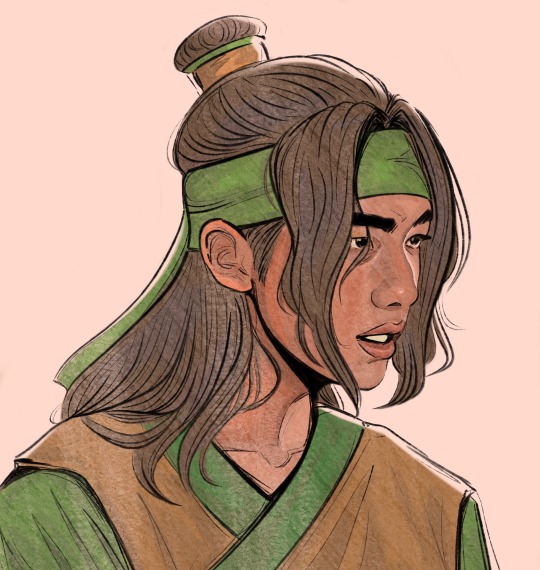
ily king on god we’re gonna get u a razor
#id in alt text#avatar the last airbender#atla#HARU#art#mart#underrated king….#just shave that mustache & he’s perfect#i definitely disregarded him for way too long (for unfortunate facial hair decisions i must say)#but he’s literally awesome and so cute w katara <33 and brown <33#also yes i am now obsessed w this watercolor painting technique and i will probably draw everything in this style for the foreseeable future#until i inevitably get sick of it of course#but rn in my mind im like wow this looks sooooo good#and it’s so easy#thank u procreate pocket watercolor & calligraphy brush u guys are my best friends <3#friendship ended w wet acrylic etc etc#anyway. i love him he’s so wretched of the earth core. literally#also his hair is so fun to draw#his beautiful luscious locks#if haru has ten fans i am one of them if haru has zero fans i am dead etc etc etc
397 notes
·
View notes
Note
It’s me again, and I’ve got another ask for ya @comradekatara
And no stupid pol meme’s that I gave only a cursory glance too and stupidly screenshotted this time!
I’ve seen a few of your post (at least I think it was your’s) about LOK. So I was wondering. In regard to the main villains, who is your least favorite/most disliked?
And what would you change about their motivations and perhaps their “villainous” means to make them a more compelling and/or sympathetic character?
lol this is a pretty big ask. i mean basically every villain in lok is completely incoherent thematically, politically, ideologically. people will call amon a communist but he doesn’t actually give a shit about economics or class in any capacity. people call unalaq a theocrat but as far as im aware he isn’t exploiting people’s spiritual faith to gain power, (maybe that’s what he was doing at first, but) he literally wants to submerge the world into “darkness” for one million years for… reasons and purposes. unalaq/vaatu is by far the worst lok villain, but that’s not even saying much because it’s so patently ridiculous and cartoonish. the red lotus are actually compelling but they also love chaos for the sake of chaos (because anarchism!) and want to violently murder a teenage girl and hold a genocided people hostage to do so (despite zaheer’s supposed respect for air nomads). and kuvira is an ethnonationalist who declares herself emperor, so i guess she’s at least a somewhat coherent portrait of a real type of person who actually exists, but the fact that the fascist despot is the ONLY character who points out that republic city was built on colonized earth kingdom land is um….. not a great look?
and then side characters like tarrlok, hiroshi, varrick, queen hou-ting, suyin(???), wu(???) who aren’t really the primary villains even though in many ways they’re more ideologically coherent, are just also kind of weird for their ambiguous framing. like hou-ting is literally kidnapping airbenders and putting them in underground labor camps where they’re tortured and ruthlessly trained into forming an army, which is something that chaisee does in the yangchen novels and is regarded as utterly reprehensible and heinous for it (because it is), whereas we’re supposed to feel bad for hou-ting when she dies because murder is bad uwu. and we’re supposed to forgive hiroshi for [checks notes] attempted filicide. and varrick is just some fun wacky little guy who is a ruthlessly amoral capitalist but also he does the charleston! and isn’t him marrying his overworked, exploited assistant cute?? and not at all grossly misogynistic and horrifying???? LOL!
so i don’t think going through every villain and antagonist individually and imbuing them with depth is really a worthy use of time, since the show largely suffers from incoherence due to the fact that it isn’t cohesive at all. besides korra’s character development (which is excellent), there’s no real central idea that ties every season together. take atla instead: it’s a very linear narrative, with an established goal that is always being worked towards and once it’s ultimately completed, the show ends. lok has no idea what that central goal is. so instead of trying to fix every character, it’s better to work from the center out and first simply define that goal. the central political tension in lok is, fundamentally, a question of whether it is better to alter the status quo in various radical ways, or whether it is better to maintain the violently upheld hegemonic norm by virtue of it being the status quo (and spoiler alert, it’s the latter!). and these radical ways, whether it be the terrorist movement of a fraudulent right wing populist dictator, or the terrorist movement of a bunch of commies, is always presented as equally dangerous and in need of korra’s gaggle of cops, liberals, and capitalists to suppress. what a great show.
however, the lok that lives in my head does away with most of that, and simply focalizes the conflict between the white lotus and the red lotus as diametrically opposing forces both vying to control korra’s position in the world as avatar and reconstitute her legacy on their terms. because korra’s arc is fundamentally about learning to define her selfhood and her role in the world on her own terms, and the one commonality between every villain is that they’re trying to suppress or control her identity in some way. because it’s also, incidentally, a show primarily concerned with the value of identity politics, and doesn’t actually give a shit about any of the class struggles that underpin the show’s worldbuilding and inform so many of its primary characters. so while i’m not opposed to korra’s struggle of identity, and in fact appreciate it a lot and find it personally affirming in multiple ways, korra deserves a show that is actually worthy of her brilliance as a character.
it’s not that korra shouldn’t struggle to establish her identity on her own terms, but that the politics through which they attempt to communicate this struggle are incoherent. so i would simply reframe the conflict as one primarily between the white lotus, who are reformist liberals at best, and neoconservative reactionaries at worst. we see the best of the white lotus in atla (arguably), and the worst of the white lotus in the yangchen novels (which are fascinating and excellent and everyone should read them). xai bau is only ever mentioned in a single exposition dump (in one of the only truly great episodes of lok, i might add), but his philosophy and role in the narrative is nonetheless fascinating to me. the idea that the white lotus becomes more public facing after the war, leading to its detractors also growing more vocal, is genuinely interesting. the conflicts established between the white and red lotuses are genuinely compelling (to a point). but they never truly address how the white lotus kept korra locked away in a compound for the first 17 years of her life, they never meaningfully address the harm the white lotus has done to her and to the world.
like, of course korra couldn’t master airbending, the element of freedom, if she’s never been truly free. korra spent her entire life in a gilded cage, her role in the world and legacy defined for her by liberals who wanted her to be some kind of supercop instead of a genuine spiritual leader. it’s not korra’s fault that spirituality and harmony and meditation are difficult for her, she was literally denied those facets of herself for her entire adolescence. the white lotus constitute a microcosm of the ruthless neoliberal society korra encounters when first arriving in republic city. the white lotus are a metonym for the liberal identity politics centrist reformist vision of the world that lok uncritically presents as the ideal. in a better show, korra would question those systems, disavow them, and even perhaps attempt to dismantle them. korra would define her freedom of self on her own terms by realizing the ways in which the white lotus and their broader ideology has harmed her.
that said, the red lotus is also flawed. and i don’t just mean because they’re chaos-hungry terrorists who love to murder with impunity, but because they’re in the business of denying korra’s agency as a human being and not simply as the avatar. they want korra dead because they don’t believe in the role she embodies. and you know, they can want that for understandable political reasons without being completely evil about it, but obviously in a show as facile and shallow as lok, no they can’t. i think that korra’s brief pause in considering zaheer’s point of view should have lasted longer. i think that korra should have become disillusioned by the white lotus and the stipulations of capitalism (as early as book 1, frankly), and she should have genuinely considered joining them. and once she does eventually disavow them too, it’s not because of their evil commie politics, but because they’re also in the business of dictating her role in the world, and korra can’t stand to be boxed in by anyone, certainly not from people who claim to be in the business of dissolving borders.
so pretty much every villain in lok would fall under either the umbrella of white lotus operatives (whether direct or indirect) or red lotus (whether direct or indirect). people who want korra to be the world’s ultimate cop who upholds the systems that benefit them, or people who think that the avatar has no place in a truly just world, for (honestly) kind of valid reasons. the red lotus would be antagonists who work against korra’s arc of establishing her own freedom and agency, but the white lotus would be the “villains.” and the capitalist juggernauts who mistreat and exploit their workers (and their assistants and their daughters etc etc) would not be let off the hook so easily either. the neocolonial tensions in republic city wouldn’t be framed as an issue of the distant past. the issues of class and colonialism would be foregrounded alongside korra’s struggle to establish her identity. and then, perhaps, the narrative would finally cohere.
#745voiceofthepeople#asks#lok crit#analysis#korra#white lotus#red lotus#oh lok that lives in my head…… save me korra save me…..
42 notes
·
View notes
Note
The Awakening is one of the most underrated episodes in the series.. this episode was such a turning point for aang
Aang first ran away in a storm to avoid his duty, and now he’s running away in a storm to do his duty. Poetic!
Love also Roku and Yue in this episode
yes! the way this episode establishes so many of the central tensions for the final season and parallels basically every character so deftly is perfect. the chiastic storm symbolism, the storm inside aang of crushing responsibility and guilt and grief and rage…. and in both cases, whether it’s to run away or to attempt to face his problems head on, leaving behind his loved ones (like he tried to do in the crystal catacombs) is always the wrong choice, he needs to rely on his friends. and his friends need him too. katara’s speech about how aang thinks he has to do everything alone kind of seems out of left field considering aang has always valued and cherished forming deep bonds, especially with katara. but then you remember that katara’s last memory of aang, that has been haunting her for the past however many weeks she’s been on that boat desperately trying to save him, was aang (unintentionally) martyring himself. and that would be traumatizing for anyone to witness, their best friend literally dying in their arms, but it’s especially triggering for katara because it’s happened before. kya died for her. hakoda left her. sokka emotionally abandoned her in his promise to die for her.
being a waterbender, the last waterbender, is such a complicated role for katara, because on hand she must feel immense guilt over the way her entire family and tribe prioritizes her life, and is especially motivated to become the world’s greatest waterbender specifically to prove that her mother’s sacrifice was not in vain. but it’s also that drive to be the best that awarded her the spirit water, that gave her the ability to heal aang when history repeated itself. katara couldn’t save kya, she couldn’t make hakoda stay, she couldn’t heal jet, but she can with aang. she literally brings the avatar, struck by lightning while in the avatar state (thus effectively ending the line of avatars were he truly dead) back to life. katara revived him as the inciting incident of the entire narrative, and then she revived him again in their darkest moment. because katara will continue to bring back hope to the world, resoundingly, through sheer force of will, with nothing but her bare hands and overflowing heart.
i do love aang’s arc in this episode, the narrative parallelism, the tragedy of him burning his glider, his last physical relic of his past and his people. i love the way he is so determined to perform the duty he has shied away from for so long due to the shame and humiliation of actually trying, and failing. of course aang was already motivated to perform his duties to the world, because guilt is a hell of a motivator, but the existential terror of actually being killed adds tenfold motivation. instead of running away from his problems, aang is now running towards them, equally as thoughtlessly and hastily. because he is too ashamed to care about tact, he just wants to rectify his devastating mistake. and that’s why he says that he needs to regain his honor. scarred and humiliated and lost, he finally understands how zuko feels.
zuko acts as the third side of a prism through which he, aang, and katara, are all refracted and reflected in one another. this episode makes use of that parallelism both in the contrast between zuko “finally regaining his honor” (illusory, of course, but he gets to come home and see his father again, and that’s all he’s wanted all along) while aang has lost it, and zuko confronting his father for the first time in three years, just like katara does. katara is angry at hakoda, her anger exacerbated by her grief over aang. she’s angry that hakoda left them, even if logically she doesn’t blame him for it. and she doesn’t mask her anger (i don’t think she’s even capable), and hakoda, for his part, receives it, listens to her, treats her with love and affection, holds her, acknowledges his own pain. it’s an incredibly beautiful scene; the episode is excellent if only for that scene.
it’s also immediately followed up with its opposite. zuko walks into ozai’s chamber, no anger only fear, kneels before his throne while ozai circles him like a predator (a move that both zuko and azula picked up from him). even a few episodes later, in “the beach” when azula asks, “are you angry at dad?” zuko’s face falls open and vulnerable, almost afraid at the accusation, and goes, “what?? no!!” even though it’s a perfectly fair question. ozai banished zuko for three years when he was still a child, whereas hakoda left katara for three years when she was still a child. katara resents hakoda for leaving against his will whereas zuko doesn’t even feel like he’s allowed to resent ozai for anything. ozai never once actually touches zuko, but zuko still flinches. zuko kneeling on the ground while ozai circles him like a hawk. hakoda and katara holding each other, both in tears, both open and vulnerable. zuko katara parallels always make me go crazy, of course, but this is one of the most insane juxtapositions in the entire show to me. i just love the katara hakoda reconciliation scene, and all the more for its narrative impact as it precedes zuko and ozai’s.
the ozai face reveal is also pretty incredible imo. for the past two seasons, ozai’s face as been obscured by shadow, framed only at angles that made him unknowable to the viewer. he is a larger than life villain, to both aang and zuko, not simply a man but something far greater and more terrifying. except no. he is just a man. zuko returns home, and immediately sees that. the ozai of looming shadow from zuko’s faulty memory is in fact just some guy. a uniquely powerful guy, of course, but he’s not gargantuan, too great to be comprehended by mortal eyes. zuko was just a child when he left, but he has since grown, in many ways. and while ozai still terrifies him to his core, because how could he not, we see, as zuko sees, that he is just a man.
as the image of aang’s goals becomes clearer in his eyes, he too, learns to see ozai as just a man. in the following episode he even crafts his likeness out of noodles (“impressive, i admit”). ozai is not some fantastical godlike being. no, aang is the fantastical godlike being in question, and it’s his literal god-given right to humble that man playing god who claims that aang has no place in his world. to obscure ozai’s face is to illustrate the sheer magnitude and terror of the power he wields. and to show ozai’s face, and then over the course of a season, continually undermine him and mock that face and depict it as noodles, or pantsless, is to take away some of his power, his cultivated, dictated, arbitrary power.
the awakening is a fantastic episode as it sets up the central internal conflicts for book 3, especially for aang and zuko, but also for katara, acknowledging the weight of her grief as it culminates in “the southern raiders.” (also her waterbending progress as it’s demonstrated in that one scene is incredible, i guess being at sea helps in one’s waterbending, who’d have thunk!) it’s basically a microcosmic encapsulation of the entire season, appropriately ending on a loving gaang hug as they promise to help one another through this. the heart of the show lies in that hug. it’s a fantastic episode.
#lilith-91#asks#analysis#aang#katara#zuko#ozai#hakoda#aang&katara#aang&zuko#katara&zuko#ozai&zuko#hakoda&katara#aang&ozai#i let this ask sit in my inbox for a while bc i knew i was gonna write a whole fucking spiel#but yeah. good episode i agree 👍🏼#also i love how say ‘every’ character but then proceed to only talk about aang katara and zuko#wym that’s not every character???
67 notes
·
View notes
Photo
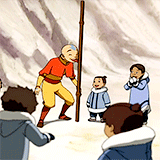


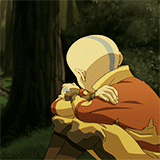
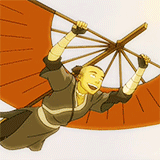
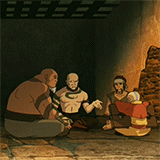
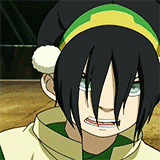


No matter who you are or what you look like, just remember that Aang thinks you’re interesting and would like to be your friend.
27K notes
·
View notes
Text
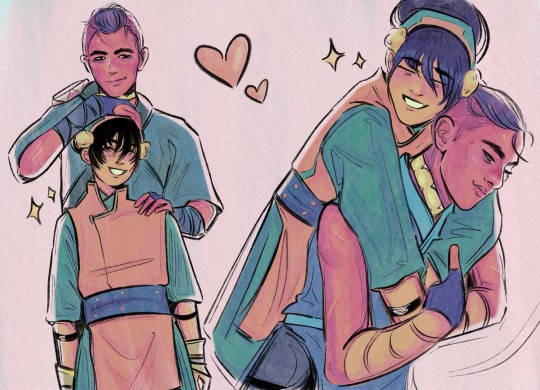
most important friendship of all time ever
#id in alt text#avatar the last airbender#atla#toph#sokka#sokka&toph#art#mart#right hand arm man…. silly rabbit……#they mean so much to me it is kind of crazy#and i need to draw toph more. just like in general#i love her so much…..#them….
322 notes
·
View notes
Note
nothing too insightful to say just !!! toph is the disabled character of all time and it means so much to me, personally. thinking specifically about what you mentioned on the last post about how she learns to let herself be loved; it is often such a fundamental aspect of growing up with a disability that “love” is the guise that adults stripping you of agency wear.
it’s not just being helped in a way that harms and deemed incompetent. it’s being perceived as incompetent, receiving help for your disability that strips you of autonomy, being vulnerable to the abuse and unable to speak for yourself in response to it because you are too frail, helpless, all under the premise of “love.” when disabled love becomes the equivalent of burdening another and being taken from yourself, toph is kind of incredible because it took me nearly twenty years to even begin to unlearn all of that, but she managed to open herself up to others within a few months (to varying degrees, it’s also interesting she seems to trust sokka the quickest, maybe i will send another ask after breakfast rambling about that).
but toph’s ability to adjust her concept of what love is and open herself to it, is genuinely one of the most powerful disability arcs i have ever seen. she becomes able to accept help and not have that feel like embodying weakness, which feels dangerous when disabled because your perceived social weakness is why you have been stripped of all agency and dehumanized, esp. as a disabled child. toph is incredibly strong in regards to earth bending, but truthfully it is this ability to listen, observe and adapt that is her greatest strength. her character is soooo good and her arc is so fucking beautiful
YES 💗 i don’t talk about toph’s disability enough because i don’t like getting too personal on here but you really do articulate that struggle perfectly and i agree so much with what you said.
toph’s foundational trauma is tied not to her experience being blind, but rather the abuse she received due to her blindness. the struggle of being disabled is always twofold: firstly, and i hate when people sugarcoat or ignore this, having a physical disability does make life more difficult. we see toph struggle when she’s not in a position to use her earthbending as a mobility aid; there are aspects of life that are difficult or genuinely impossible for her to participate in due to her limitations. she can and does often compensate by being a brilliant earthbender, but there are still some things she simply cannot do.
but what’s more important to toph’s experience with disability is the way she is treated by those around her, especially her parents. toph simultaneously struggles with being coddled and smothered due to her unique needs, denied agency due to the assumption that she is somehow less able to dictate her own choices, and treated like a shameful burden due to her disability. so by the time toph joins the gaang, she is very afraid of being seen as a burden, but she also doesn’t want anyone helping her with anything or telling her what to do, because she associates that with her parents’ abuse.
she bristles when katara tries to get her to help out, because she wants to be the kind of person who respects everyone else’s space and lets everyone be capable of “carrying their own weight,” just as she wants to be allowed to be left to her own devices. she doesn’t yet understand that a community or support network is not the same thing as a denial of agency, and so she assumes that katara is overbearing and motherly instead of a kid who comes from a place where everyone does an equal share of labor and expects everyone else to do the same.
that’s why i think a lot of people who have never experienced any kind of major disability firsthand don’t really understand toph, and just assume she’s spoiled and brash due to being rich and entitled. but that’s not the case at all. she’s spent her whole life being treated like a fragile doll instead of a person, and it’s dehumanizing and isolating. she doesn’t understand the value of a community because she’s sick of people trying to help her, and due to her own experiences being “helped,” assumes that help is necessarily negative and a denial of one’s agency.
the last thing she wants in that situation is to be overbearing, to be the one telling other people what to do and how to live their lives (yet another reason why she would never become a cop). of course, she signed on to be aang’s teacher, so pretty quickly she does have to get over herself and actually instruct, and she’s not a gentle pedagogue either. but she also knows that she is supremely qualified to teach earthbending, and so it’s easier for her to tell others what to do when she knows that her wisdom counts for something and she isn’t just imposing her will onto someone else for the hell of it, or because she doesn’t respect them.
she also definitely takes iroh’s advice to heart, because unlike a certain incorrigible nephew, she’s really wise and emotionally mature, able to respond to measured advice and actually internalize what iroh is saying. so it doesn’t take long for her to develop a bond with sokka where she doesn’t feel afraid to rely on him. and it’s funny, because she accuses katara of being overbearing and motherly, but she does actually listen to sokka and follow his every command, despite her supposed disdain for authority. and i think it’s the fact that even though sokka does sometimes forget that she’s blind, he’s never purposely insensitive, and he never bosses her around for the hell of it.
unlike katara, who is genuinely unkind to toph in “the chase,” sokka never disrespects toph, and he certainly never disrespects her disability. he’ll banter with her about it, like when he says “well you’ve never not seen anything like this” in “sokka’s master,” but the joke isn’t at her expense, unlike “the stars sure are beautiful tonight,” which is straight up cruel and lowkey unforgivable (sidenote: as someone who has been bullied for being disabled, i do think that this is hands down the worst thing katara ever says in the show, and i understand why toph would continue to hold a grudge against her for that for a long time). whereas sokka always treats toph like a person, and toph recognizes that, so she thus not only accepts his help, but actively asks for it and enjoys receiving it.
toph does grow and accept her own vulnerability remarkably fast, but to the gaang’s credit, they are great friends, and they all treat her like a person instead of a burden or a doll (including katara). having people who love you and understand you, both in terms of your strengths and your limitations, is really necessary, for anyone, but especially for disabled people. i’m really lucky to have people in my life who love me like that, and toph’s arc is so beautiful specifically because she is given that love and care and never takes it for granted. i definitely think that toph is one of the greatest disabled characters of all time, and it’s because her disability isn’t simply incidental to her character, but rather the central pillar of her arc that informs all her motivations at all times. she learns to ask for help, and accept help when it’s offered. she finds a community.
#amorphousea#asks#toph#analysis#katara&toph#sokka&toph#she means so much to me…..#and please do send that follow up ask about sokka because their dynamic is so important#honestly it’s probably what got me to like sokka in the first place#crazy i know . but his friendship w toph is just so perfect#& it rly made me appreciate him more as a kid
76 notes
·
View notes
Note
hi, I'm back again with the jujinta parallels after finishing the legacy of yangchen (it's definitely my favourite of the avatar novels and is in my top ten books I think) and so sorry for how long this is (i have too many thoughts about them):
I think it's really interesting how yangchen and kavik are governed by three things 1)“some acts cannot be forgiven”; 2)“the one who could forgive me is not there anymore”; and 3) jujinta's old habit of begging forgiveness from the spirits each time he does wrong since he cannot ask forgiveness from his brother.
1) kavik never truly learns to forgive himself for any of his actions. he has blamed himself for kalyaan's suffering ever since they were kids and never considers that maybe kalyaan did these to himself and thus should be properly held accountable for his own actions. even after finally outsmarting his brother and hurting him in a way that FINALLY leaves a mark; kavik still wants to protect him (granted there is kavik has a nephew now. which).
but also right to the very end of the book, kavik never forgives himself for betraying yangchen, even though she tells him that she has forgiven him and thus he doesn't have to serve her in order to get in her good graces anymore.
as for yangchen, we see her give up more and more parts of herself by going against her own moral code for the sake of protecting the world. such as when she “made jailers out of her people” by holding the firebenders and henshe in the northern air temple. when yangchen does wrong, even if it's for a good cause, she welcomes punishment such as her calm acceptance of being exiled from the northern air temple and also her acceptance of the knowledge that her people would hardly accept her as theirs after her death with all the un-air nomad things she has done in the name of protecting the world.
2) and 3) pretty much go in tandem: in yangchen's case, she wants to be the avatar she believes jetsun wanted her to be: good, just, honest, inspiring, etc. especially because jetsun died to save yangchen and also because yangchen was powerless to stop the spirit attack. but the world doesn't afford her that luxury, so she has to make one morally questionable decision after the other and this kills her each and every time. however, she DOES get her forgiveness after finding jetsun in the spirit fog. the scene with yangchen and jetsun is so powerful because yangchen finally admits out loud how she doesn't want to be the avatar anymore as all this job has given was suffering and more suffering, but also she can't give it up, but she doesn't quite understand WHY she can't just give up. and jetsun replies with how taxing it was taking care of yangchen and how she pretty much gave up whole parts of herself to be yangchen's primary caretaker, but that she wouldn't change it because she loves yangchen. they are both in very emotionally draining and mentally taxing places in life, but also acknowledge that it's where they're meant to be. a very beautiful scene.
for kavik, he doesn't believe that he deserves yangchen's forgiveness at any point in the story and he accepts that she never will. so he gives himself up to yangchen's service, even when she urges him not to. his need to be forgiven by her even trumps his need to protect kalyaan in the end with the whole plot to get stabbed and “tortured” in front of kalyaan thus really taking advantage of kalyaan's weakness (which wasn't something kavik would have even thought to do a few chapters before). this shifts “the one who could forgive me” from kalyaan to yangchen. so like jujinta, who found new purpose/way to find forgiveness in serving yangchen while not entirely forgiving himself for his brother's death; kavik finds a new purpose in seeking unearned (in his opinion) forgiveness in yangchen's service, while also forgiving himself to admit that kalyaan earned his own punishment.
(sorry this was so long, I just have a lot of thoughts about the dawn of yangchen jujinta/kavik/yangchen parallels and how much being forgiven by someone whose forgiveness seems/is unattainable (including yourself) is such a big part of the characters' journey)
this is beautifully put! i really have nothing to add here, since you basically said it all. thank you :)
#yourlocalamoeba#asks#and don’t apologize for the length i value thoroughness#(as I’m sure you already know)#analysis#the legacy of yangchen#yangchen novels#kavik#yangchen#jetsun&yangchen#kalyaan&kavik
29 notes
·
View notes
Text

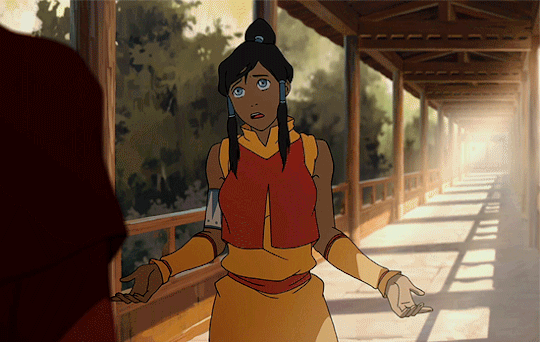
KORRA in s01E02 — A Leaf in the Wind
206 notes
·
View notes